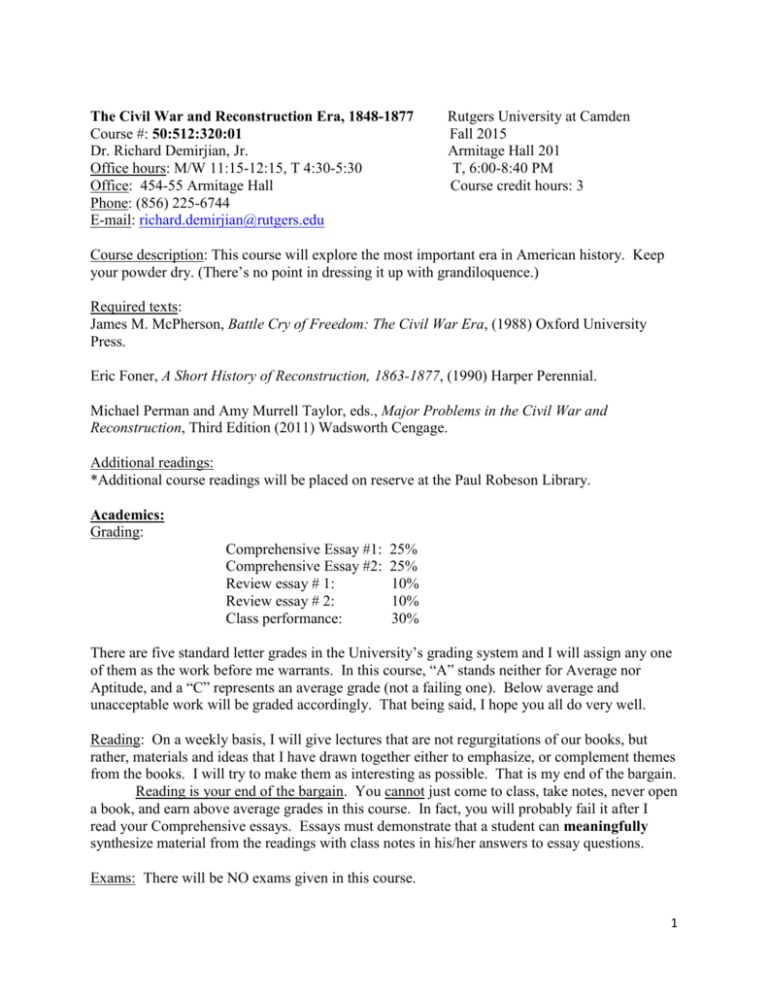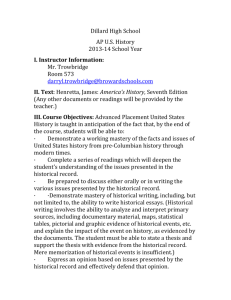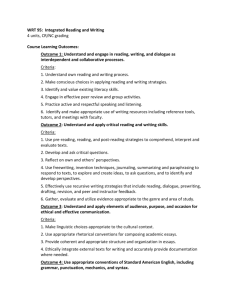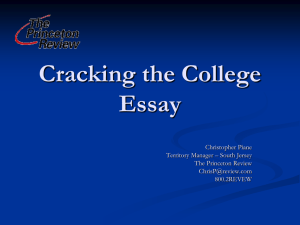Syllabus - Rutgers University
advertisement

The Civil War and Reconstruction Era, 1848-1877 Course #: 50:512:320:01 Dr. Richard Demirjian, Jr. Office hours: M/W 11:15-12:15, T 4:30-5:30 Office: 454-55 Armitage Hall Phone: (856) 225-6744 E-mail: richard.demirjian@rutgers.edu Rutgers University at Camden Fall 2015 Armitage Hall 201 T, 6:00-8:40 PM Course credit hours: 3 Course description: This course will explore the most important era in American history. Keep your powder dry. (There’s no point in dressing it up with grandiloquence.) Required texts: James M. McPherson, Battle Cry of Freedom: The Civil War Era, (1988) Oxford University Press. Eric Foner, A Short History of Reconstruction, 1863-1877, (1990) Harper Perennial. Michael Perman and Amy Murrell Taylor, eds., Major Problems in the Civil War and Reconstruction, Third Edition (2011) Wadsworth Cengage. Additional readings: *Additional course readings will be placed on reserve at the Paul Robeson Library. Academics: Grading: Comprehensive Essay #1: Comprehensive Essay #2: Review essay # 1: Review essay # 2: Class performance: 25% 25% 10% 10% 30% There are five standard letter grades in the University’s grading system and I will assign any one of them as the work before me warrants. In this course, “A” stands neither for Average nor Aptitude, and a “C” represents an average grade (not a failing one). Below average and unacceptable work will be graded accordingly. That being said, I hope you all do very well. Reading: On a weekly basis, I will give lectures that are not regurgitations of our books, but rather, materials and ideas that I have drawn together either to emphasize, or complement themes from the books. I will try to make them as interesting as possible. That is my end of the bargain. Reading is your end of the bargain. You cannot just come to class, take notes, never open a book, and earn above average grades in this course. In fact, you will probably fail it after I read your Comprehensive essays. Essays must demonstrate that a student can meaningfully synthesize material from the readings with class notes in his/her answers to essay questions. Exams: There will be NO exams given in this course. 1 Papers: A) Review Essays (10% each): All students in this course will write two “review essays” wherein they will compare and contrast assigned sets of essays from Major Problems in the Civil War and Reconstruction- these are approx. 15-25 page sections that appear at the ends of the book’s chapters. The class will be broken up into two writing groups upon an alphabetical basis for these assignments (Group A: A-Mc, and Group B: Me-Z) and topics are assigned and papers are due in successive weeks of the semester. *Students may not negotiate out of assigned paper topics. You have ample notice of the assignment and date due. Do your best with your assigned topic. The first set of Review Essays on Third Party system politics (A) and sectional nationalisms (B) will be due on Tuesday, September 29/ Group A and Tuesday, October 6/Group B, respectively. The second set of Review Essays on Radical Republican politics (A) and post-emancipation Southern life (B) will be due on Tuesday, November 24 and Tuesday, December 1, respectively. **Papers should be no more or less than 4 full pages long; edit well. Guidelines for writing the papers are posted on the course Sakai site under “Resources.” B) Comprehensive Essays (25% each) All students in this course will also write two “comprehensive essays” in which they will address comprehensive questions by synthesizing lecture materials, readings, and any potential video materials as directed. These will be lengthier papers that will require the students to demonstrate comprehensive mastery of the issues and materials the essays ask them to address. The first comprehensive essay will be due on Tuesday, October 27 and the second comprehensive essay will be due on Tuesday, December 8. Guidelines for writing the papers will be distributed in class only. You will have had ample time to have completed the comprehensive essays if you have done the assigned reading and studied the course material with some regularity. Therefore, lateness beyond the prescribed time is unacceptable and will be penalized. Detailed instructions for both comprehensive essays will be handed at review sessions in out in class beforehand. *Review sessions for the essay assignments will be held on Tuesday, October 20 and Tuesday, December 1. I will not accept late submissions of Comprehensive Essay #2. (see p. 7) I will not repeat instructions given out at the review sessions. I tell you well in advance: notify your employers, other professors (with field trips), etc., that you are unavailable at those times. Quizzes: I may give surprise, or “pop” quizzes if I feel it necessary. Students are expected to do the assigned reading and come to class prepared to participate in discussions. If I sense that the same handful of people is carrying all the discussion and that no one else is reading, I may well give a quiz. It’s simple, if you don’t want quizzes: read. Potential quiz scores will be factored into a student’s class performance grade as they reflect daily preparedness. 2 Students must pick up essays or papers promptly: There is a one class meeting grace period. Papers which are not picked up within one class meeting of the day they are handed back will begin to be penalized 5 points per class meeting. In other words, if I hand back papers on a Tuesday and I am still holding your paper after class on the following Tuesday- your “84” just became a “79.” If I still have it after class on the next Tuesday- it will convert to a “74,” etc. I do not enjoy “caddying” students’ work around in my briefcase for weeks at a time. If you are that disinterested in your work, the declining grade shouldn’t bother you anyway. This policy will not apply to students with excused absences. I determine what constitutes an excusable absence. Class performance (30%): Students should come prepared to discuss the assigned readings during each class meeting. Class performance will be graded on a weekly basis, and will be based on the quality and/or quantity of the student’s responses. *Student conduct including attendance, punctuality, and classroom conduct, as well as any quiz grades, all factors into this portion of the course grade. Class performance is graded and recorded systematically as follows. If you are absent you receive a 0 (not an F, a zero) for that evening. If you come to class and sleep or fall asleep you receive a Z (for Zzzz). Typically the Z is superimposed over the √ you received when attendance was taken, and that you would have retained had you continued to blink; but it carries the weight of a zero rather than the original √. If you come to class on time but don’t participate you receive a √. (a C: you found the room, you have a pulse; that’s as average as it gets) If you come on time and participate you receive a √+. (a B: good, you’re trying) If you come on time and participate at a high level you receive a √++. (an A: great work, insightful) If you attend but are late, unprepared, disruptive- including excessive sidebar conversations, etc. - or roll your eyes at me to let me know just how dull I really am, you receive a √-. (a D: that’s poor! Try it in the workplace and see how it flies!) Bottom line: these types of in-class behaviors or attitudes are not conducive to a productive learning environment and your grade will suffer for them. I will call on you: This is a 300-level history course and the expectation is that you either are a History major, or you are someone who wants to be here and learn history; particularly, Civil War history. (“I needed 3 credits and this fit my work schedule,” “I’m really not a history person,” “I don’t like to talk,” etc., will not be valid disclaimers for not participating in this course) Part of the process of learning history is discussing it. We read, we write, and we discuss: that’s what historians do. You will even be engaged in a lesser form of research in your reading and writing assignments! At any rate, it is difficult to assess students’ grasp of books, documents, or ideas when they do not speak. I will at times call upon students who do not have their hands raised. *Contemporary perceptions aside, this is not intended to “dis” you,* but rather, to help me to evaluate your understanding of the material and thus better evaluate your class performance. It is my job to know whether you are learning or not, so come to class prepared; this means having read, and thought about, the material. Likewise, you may call on me: I am happy to answer any student questions pertaining to the material or era which I am able to. 3 e-mail: All students are expected to be available through the Rutgers e-mail system. I will not send separate e-mail messages, or cc’s along for students who are not on the Rutgers system. You will not receive course Sakai Announcements if you are not on the RU system. It is your responsibility to make sure you are getting any e-mails or notifications through the Rutgers system. Robeson Library 1st Floor is home to the computing center. Extra credit: There will be no individual “extra credit” opportunities in this course. Student Conduct: Attendance: Be here. Students are expected to attend all class meetings. Class performance comprises a good proportion of your grade. Those who do not attend will receive zeroes (0’s) for those days. **Students who come to class and sleep will also receive zeroes, as they are effectively absent for any scholastic purposes. I am more interested in whether or not your mind shows up. These zeroes will seriously impair your class performance grade and I do not compromise on this. My suggestion: coffee (whether you like it or not), Mountain Dew, whatever it legally takes, but don’t sleep in class. Students who choose not to attend class are responsible for all materials, instructions, and /or scheduling changes covered that day and should be prepared to get the appropriate notes or information from a classmate, not the instructor. Make a friend: If you do not attend class, do not e-mail me to find out what happened- I already covered it all once. Make a friend today who will help you to catch up or stay informed in such circumstances. Each student is expected to get the contact information for 2 classmates for such purposes. Punctuality: Be here on time. Students who stroll in late are marked proportionally absent for the evening and the lateness factors into the student’s class performance grade for that night. Lateness over 15 minutes (once) or habitual disruptive lateness will earn students a ‘D’ score (65) for the evening. As parking for evening courses is difficult, it is recommended that you try to arrive at campus by 5:15 for a 6PM course. Yes! You need a note!: Students who cannot attend class for ANY reason and wish to demonstrate the validity of their reason - and thus be excused- need a note. Students who are ill need a note from the doctor or University Health Services. “I didn’t feel well/couldn’t get out of bed,” although suggestive of illness, is nonetheless an insufficient explanation. Quite often, students inform me of circumstances involving various tragedies or extreme personal difficultiesparticularly around assignment due dates. Or, students may, for some reason, be forced to miss extended class time. The proper way to handle such situations is through the Dean of Students’ Office, which contacts all the student’s instructors about the student’s situation. If your story is not documented, your absence is not excused – period. *This means that papers will be counted as late- or not accepted at all.* I will not be put in the embarrassing position of asking you for documentation. Therefore, I am telling you in advance that it is required and that it is your responsibility to bring it to me without my asking. You must provide me with a note or a copy of the note (if multiple instructors require notification); not simply show me or tell me about a note. 4 *Electronic devices: Students must turn off all cell phones, pagers, blenders, etc. before entering the classroom. Also, do not take out any hand-held electronic device during class for any reason. I cannot stress this strongly enough. If you do, you will be asked to leave. If it happens a second time, I will move to have you removed from this course. Consider this the sole warning on this matter. Tape recorders: You may not record my lectures; not in this sound bite society of ours. Tentative Schedule: Week 1, (9/1): Course introduction Lecture : Antebellum Roots of the Civil War Readings for Week 3: (ca. 90 pp.) A) McPherson, Ch.1 B) Ch.1 documents and essays in Perman and Taylor “Reader,” C) Bruce Levine, The Fall of the House of Dixie, Ch. 1, on library reserve. Week 2, (9/8): NO CLASS Week 3, (9/15): Lecture: “Free Soil, Free Labor,” or “Positive Good”?: Wilmot, Mexico, and the Sectionalization of the Jacksonian Party System Readings for Week 4: (ca. 130 pp.) A) McPherson Chs. 2-3, B) Reader, Ch. 2 documents and essays, C) George M. Frederickson, The Black Image in the White Mind, Ch. 2 on library reserve. Week 4, (9/22): Lecture: “Violence is the Order of the Day”: American Politics and Justice, 1855-1857 Readings for Week 5: (ca. 150 pp.) A) McPherson, Chs. 5-6 B) Reader, Ch. 3 documents and essays C) Eric Foner, Politics and Ideology in the Age of the Civil War, Chs. 4-5 on library reserve *Group A Students write Review Essay #1A (Gienapp/Fehrenbacher) due next week. 5 Week 5, (9/29): *Review Essay #1A due Lecture: “We Must Try to Save the Union”: The Failure of Politics, 1857-1860 Readings for Week 6: (ca. 140 pp.) McPherson, Chs. 7-9 B) Reader, Ch. 4 documents and essays *Group B Students write Review Essay #1B (Grant/Sinha) due next week. Week 6, (10/6): *Review Essay #1B due Lecture: 1861: The Civil War Awakening Readings for Week 7: (ca. 130 pp.) A) McPherson, Chs. 10-11 B) Adam Goodheart, 1861, Chs. 5-6, on library reserve. Week 7, (10/13): Lecture: 1862: A Tale of Two Wars Readings for Week 8: (ca. 155 pp.) A) McPherson, Chs. 13 and 15 B) Reader Ch., 5 documents 1 and 2 and Gallagher essay only C) Goodheart, 1861, Ch. 8 on library reserve Stephen Sears, “The Ordeal of General Stone,” on library reserve. **Week 8, (10/20): Comprehensive Review Session Discussion/re-cap of any Lecture material presented Weeks 1-6 and Readings discussed on Weeks 2-7 (Up to McClellan’s Peninsula Campaign/ June ‘62 only) and the essay assignment. Week 9, (10/27): *Comprehensive Essay #1 due in class only- all students Lecture: Crossroads of Freedom: Antietam and Emancipation Readings for Week 10: (ca. 100 pp.) A) McPherson, Chs. 16-17 B) Reader, Ch. 9 documents 1-4 and essays, C) McPherson essay, “The Saratoga That Wasn’t,” on library reserve. Week 10, (11/3): Lecture: 1863: Confederate High Tide, Then the Tide Turns Readings for Week 11: (ca. 145 pp.) A) McPherson, Chs. 19-21 B) Reader, Ch. 6 documents 5-6 C) Foner, Ch. 1 D) Levine, The Fall of the House of Dixie, Ch. 5 on library reserve. 6 Week 11, (11/10): Lecture: 1864-65: Grant, the Election of 1864, and the Defeat of the Southern Confederacy Readings for Week 12: (ca. 95 pp.) A) McPherson, Ch. 24 B) Reader, Ch. 5 documents 4-6 and Grimsley essay only C) Foner, Ch. 2 D) Levine, The Fall of the House of Dixie, Ch. 8 on library reserve *Week 12, (11/17): Lecture: Reconstruction as a Problem in Policy: Andrew Johnson and the Radical Republicans Readings for Week 13: (ca. 110 pp.) A) Foner, Chs. 3-5 B) Reader, Ch. 10 documents and essays *Group A Students write Review Essay #2A (Foner/Benedict) due next week. Week 13, (11/24): Review Essay #2A due Lecture: Congressional Reconstruction Undone: Southern Redemption Readings: (ca. 120 pp.) A) Foner, Chs. 6-7 B) Reader, Ch. 11 documents and essays *Group B Students write Review Essay #2B (Schwalm/Fitzgerald) due next week **Week 14, (12/1): Comprehensive Review #2/ Review Essay #2B due No Lecture: Reconstruction Readings Wrap-Up Week 15, (12/8): *Comprehensive Essay #2 due in class only- all students Film: Lincoln Week 16, (12/15): “Final Exam”, 6-9 PM 7









